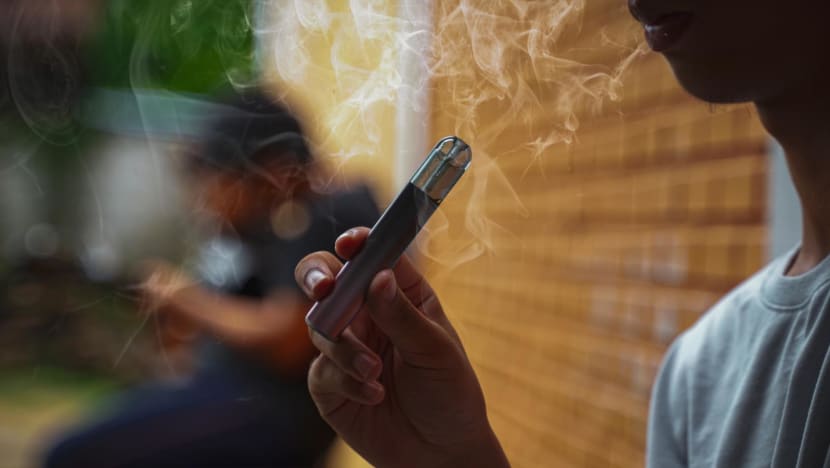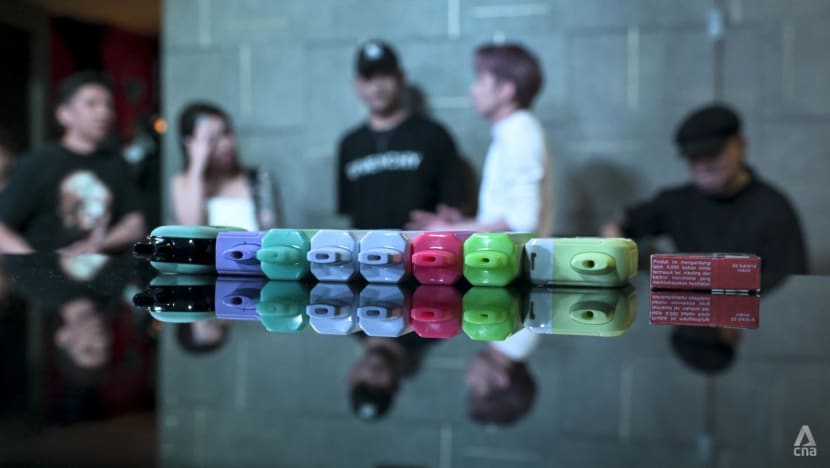Clampdown on vaping and Kpods: What changes to expect come Sep 1
New classification for etomidate, harsher penalties and increased enforcement. What else will change starting Sep 1?


This audio is generated by an AI tool.
SINGAPORE: A suite of new penalties and enforcement measures against vape and Kpod abusers and suppliers were announced on Thursday (Aug 28), with the new measures kicking in on Monday.
Here are the key changes that will take effect on Sep 1.
1. ETOMIDATE WILL BE LISTED AS A CLASS C DRUG
Etomidate - the anaesthetic agent found in some vapes known as Kpods - is currently a controlled substance under the Poisons Act, which means users may be fined.
From Sep 1, etomidate will be listed as a Class C drug under the Misuse of Drugs Act.
Under the Act, it will be illegal to traffic, manufacture, import, export, possess or consume etomidate without authorisation.
The reclassification will also allow for stiffer penalties and enforcement against both abusers and suppliers.
2. INCREASED PENALTIES FOR VAPE USERS
At present, those caught vaping are fined S$300 if they are under 18 years old, and S$500 if 18 and above. This is regardless of whether it is their first or subsequent offence.
From Sep 1, first-time offenders under 18 will face an increased fine of S$500, while those 18 and above will be fined S$700.
A second offence will require the individual to undergo a three-month rehabilitation programme, consisting of six sessions. Failure to complete the programme will result in prosecution.
For a third or subsequent offence, the offender will be prosecuted in court under the Tobacco (Control of Advertisements and Sale) Act (TCASA) and may be fined up to S$2,000.
3. RAISED PENALTIES AND REHABILITATION FOR KPOD ABUSERS
Kpod users currently face the same penalties as vape users. In certain cases, they could be prosecuted under the Poisons Act with penalties of up to a S$10,000 fine, two years’ jail or both, regardless of the number of offences committed.
Under the new framework, first-time Kpod offenders will face the same increased fines as vape users but must also attend a rehabilitation programme lasting up to six months.
Second-time abusers will be arrested and investigated under the Misuse of Drugs Act, with their statement taken and urine tested. They will undergo six months of mandatory supervision, which includes drug testing and rehabilitation.
Offenders who do not complete the rehabilitation programme will be prosecuted.
For third or subsequent offences, those aged 16 and above will be admitted to a Drug Rehabilitation Centre, followed by drug testing and supervision over 12 months. Those under 16 will undergo mandatory supervision and drug testing for the same duration.
4. MANDATORY CANING FOR ETOMIDATE SUPPLIERS
Current laws allow suppliers of etomidate to be prosecuted under the Poisons Act or the TCASA, with penalties of up to S$20,000 in fines and up to two years’ jail.
From Sep 1, the penalties will be significantly increased. Those who import etomidate face a mandatory minimum sentence of three years’ jail and five strokes of the cane. The maximum penalty is 20 years' imprisonment and 15 strokes.
Those who sell or distribute the substance will face at least two years’ jail and two strokes of the cane, with maximum penalties of 10 years and five strokes.

5. MORE PENALTIES FOR STUDENTS, UNIFORMED PERSONNEL, CIVIL SERVANTS
From Sep 1, students may face school-based penalties such as detention, suspension, caning (for boys), conduct grade adjustments and rehabilitative counselling.
In institutes of higher learning, disciplinary action could include the withdrawal of leadership opportunities, overseas exchange or scholarships, eviction from hostels for university students and fines or community service.
Repeat offenders and traffickers may be suspended or expelled. All vaping incidents in educational institutions will also be reported to authorities.
Public servants caught using, possessing or distributing vapes will be subject to disciplinary measures such as fines, demotions and dismissal. Home Team personnel may face dismissal or demotion if they are regular officers, and fines, demotions or detention if they are national servicemen.
Punishments in these specific settings will be in addition to penalties meted out by the authorities.
Singapore Armed Forces personnel will be dealt with under military law, which allows for penalties including fines, detention and discharge from service. Offenders will also undergo mandatory rehabilitation.
6. PENALTIES FOR FOREIGNERS
Foreigners found in possession of vapes will have them seized and will be fined.
Repeat offenders will face harsher consequences. Long-term pass holders – including those on Employment Passes, S Passes, work permits, student or dependent passes – may have their passes revoked and be deported after a third offence.
Short-term visit pass holders, such as tourists, will be banned from re-entering Singapore upon departure if caught again.
Those found using Kpods or testing positive for etomidate may also be deported and banned from re-entering Singapore.
7. INCREASED ENFORCEMENT
In schools, designated staff members will be trained and authorised to take enforcement action against students found abusing or distributing vapes, while institutes of higher learning will step up campus patrols.
Nicotine test kits have been issued to around 260 schools across Singapore. Metal detectors have been deployed at selected campuses to screen for vape devices, and schools have introduced a “peer vigilance culture”, encouraging students to report classmates who vape.
Within the Singapore Armed Forces and Home Team, existing urine screening for substance abuse will be expanded to include etomidate. Both agencies have increased enforcement within their premises, including tighter checks at access points.
Public transport operators have stepped up roving patrols and increased bag checks to detect vape devices.
At public areas, agencies such as the National Parks Board and the National Environment Agency have intensified enforcement patrols. The Singapore Police Force and the Central Narcotics Bureau have stepped up joint enforcement efforts with the Health Sciences Authority, with offences found during routine policing also referred for investigation.
At border checkpoints, the Immigration and Checkpoints Authority has tightened screening to prevent vape smuggling.
Various agencies will be empowered to take active enforcement actions, such as seizure of vapes and issuance of fines.
8. MORE AVENUES TO QUIT
Help is available under the QuitVape programme for those who wish to quit.
Those using Kpods can seek help from the Institute of Mental Health, WE CARE Community Services, the Singapore Anti-Narcotics Association, the Thye Hua Kwan Moral Charities and Fei Yue Community Services.
Users who come forward voluntarily – including minors referred by parents – will not be penalised.
Members of the public can also turn to the Health Promotion Board’s QuitLine for help on stopping smoking or vaping.
Vape disposal bins will continue to be available at selected locations, such as where rehabilitation and QuiteVape programmes are located, for people to dispose of vapes.
The bins that were previously placed at community clubs and Residents' Network Centre, as well as institutes of higher learning, will be removed on Aug 31.
9. ENHANCED EDUCATION EFFORTS
The Health Promotion Board will continue to work with the Ministry of Education to incorporate anti-vaping messages in school materials and prevention programmes.
Parents can also access resources and relevant information on Parent Hub and the Families for Life website, including on how to initiate conversations with their children about vaping.
A national campaign, “Don’t Toy With Your Life”, launched in June, aims to raise awareness among youths of vaping harms and promote cessation. A dedicated microsite, gov.sg/stopvaping, provides consolidated support, helplines and reporting channels. Resources are also available on the IMH website.
















